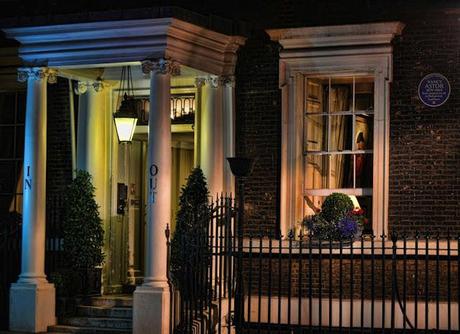Here's David Tucker with his very own opening ceremony…  Sherlock Holmes. London Walks guides.
Sherlock Holmes. London Walks guides.
Any connection? (Apart from our Sherlock Holmes walk, I mean.)
Well, they've got London in common. London life in common.
And what's London life? Oh a lot, a whole lot. You can play any number of cards from the urban Tarot deck. But let's start with a couple of leering face cards: anonymity and bewilderment.
A & B – two of the defining conditions of London life.
How to meet them? No, make that how to beat them. Well, in Conan Doyle's city on the Thames it takes a detective, 'with his comforting attention to personal minutiae, to trace' (in Holmes' words) 'the strange coincidences, the plannings, the cross-purposes' that link people 'in the city's twilight labyrinth'.
It takes a detective. Or a London Walks guide.
Okay, that's enough intro.
The Olympics are here. A star London Walks guide – Angela – has traced some strange coincidences. And what follows, by the way, is why you do the byways of this city with a great guide.
Angela's Old Palace Quarter walk takes a turn through St. James' Square. The oldest house there, No. 4, gets slid under her microscope. It's got a plaque telling us about Nancy Astor. A run of the mill guide will tell the Nancy Astor - Winston Churchill story ('Winston, if you were my husband I'd poison your tea; Nancy Astor, if you were my wife I'd drink it'), tell you she was the first woman member of parliament – and leave it at that.
Not Angela.
The connections – the strange coincidences – just come tumbling out. To wit: Lord Desborough, who was the first person to carry the flag for Great Britain in the Parade of Nations (in the "intercalated" 1906 Games) and indeed who was responsible for bringing the 1908 Olympics to London, was the father of the World War I poet Julian Grenfell. Julian Grenfell was born at No. 4. He was one of three sons of Lord Desborough. Julian and his brother were killed in World War I. The surviving brother was killed in a motor car accident in 1926.
How devastated must Lord Desborough have been. How devastated was his wife, Ettie, a character in her own right. She "married solid worth" – her biographer speaks of Lord Desborough's "dog-like devotion" – and then carried her own standard at the head of a Parade of Lovers (in her biographer's words, "she embarked on a series on long-drawn-out love affairs." In her son's (Julian's*) words: "I don't want to see you again ever because every one after you is like flat soda water."
There's more. Starting with Joyce Grenfell (every Brit over 40 will recognize that name). Oh and just for the record, the family connection between Joyce G. and Julian G. is an extremely distant one.
Joyce Grenfell's mother was the sister of Nancy Astor.
And as long as it's "the Olympic Season" – and we've already got the 1908 Olympics into play – might as well mention that Nancy Astor's brother-in-law, John Jacob Astor, represented Britain in the 1908 Games and acquitted himself very well. Won the Racquets bronze and, together with Vane Pennell, took the gold in the men's doubles.
The Astors were of course Americans. At least to start with.
More to the point as far as this country goes, the Astors were key figures in the Cliveden set. The Cliveden set were arch-appeasers. They wanted to give Hitler what he wanted. Didn't want to stand up to him.
The which set of circumstances resonates even more when you remember that just along from No. 4 is the house where Eisenhower (and his British and other allied counterparts) planned Operation Overlord. In a word, D-Day.
And that number 4 itself was where the Free French were headquartered from 1942 on.
And all of that comes spinning out of that one house. (When, that is, Angela's read her audience and adjudged them right for "going there".)
*Does this really need saying? Julian was a character in his own right. But how could it have been otherwise given his genes? Went up to Oxford with "two greyhounds, an Australian stockwhip (which he used on Phillip Sassoon, the brother of yet another famous World War I poet, Siegfried), and an immense enjoyment of life." At Balliol his "animal high spirits" frequently descended into rowdyism and bullying – ergo his nickname Roughers, which he rejoiced in.
The which, I suppose, at least in some part explains his pronouncement from the front: "One loves one's fellow man so much more when one is bent on killing him."
The full set of remarks that observation is embedded in is worth quoting: "It is all the best fun. I have never felt so well, or so happy, or enjoyed anything so much… The fighting-excitement vitalises everything, every sight and word and action. One loves one's fellow man so much more when one is bent on killing him."

